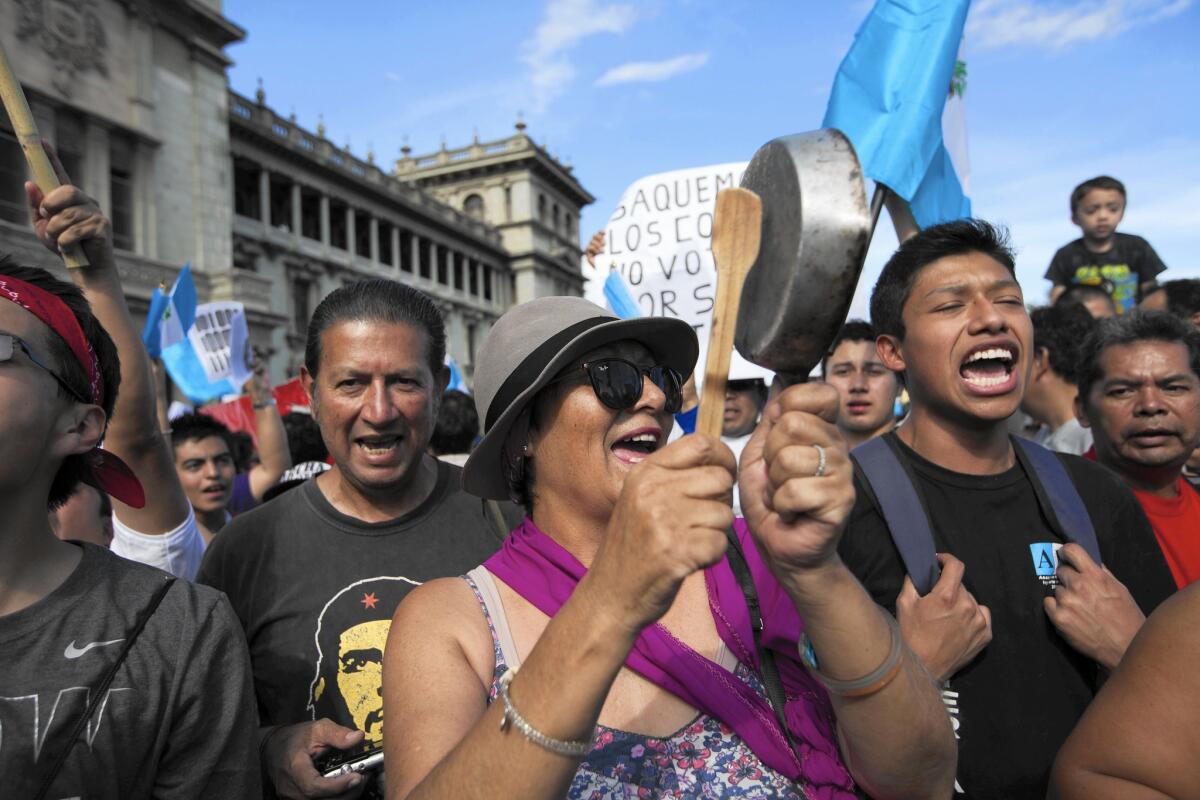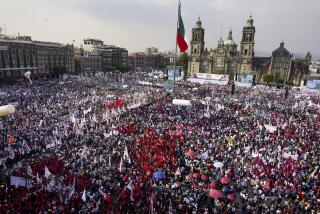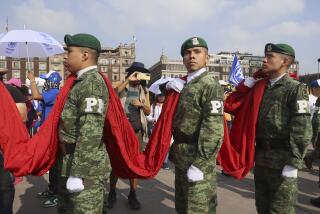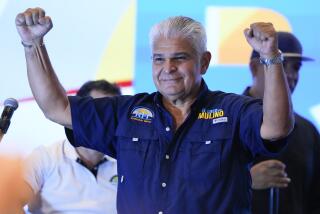Guatemalan voters doubt election will make their lives better

- Share via
Reporting from GUATEMALA CITY — One woman blurted her idea for capturing the attention of Guatemala’s power brokers: Let’s stop paying taxes.
A man sitting nearby suggested staging a labor strike in Guatemala City, the capital. Another woman wondered whether sit-ins worked better than marches in emphasizing the myriad problems faced in a nation devastated by poverty, corruption and crime.
The 30 or so members of Otra Guatemala Ya, a citizen collective, asked one another: What can we do to help create a better nation?
“People are so fed up,” said Gabriela Carrera, 28, an activist and political scientist.
For many Guatemalans, the prospects for a better life do not look good. The country’s status as a favored U.S. ally has not kept it from suffering the devastation of high crime rates, violence and weak leadership. It is one of several Central American countries from which huge numbers of migrants, including unaccompanied children, leave their homelands and head north to the United States.
The disruptive conditions, which include a corruption scandal that led President Otto Perez Molina to resign this week, have left many voters skeptical about whether anything beneficial will come from national elections scheduled Sunday.
The political pandemonium marked a dramatic coda to an election cycle defined by candidates’ promises to steer the country from wrongdoing, but also one in which no presidential contender emerged as a clear favorite ready to lead the country in a new direction.
Longtime front-runner Manuel Baldizon, a business tycoon who came in second in the 2011 election, has dropped in the polls. Despite a strong advertising presence in much of the countryside and campaign videos painting him as the right candidate for a “moment of change,” some see Baldizon as the newest face of the status quo. His vice presidential running mate is accused in what authorities say was a scheme involving money-laundering.
In recent weeks, comedian and actor Jimmy Morales appeared to tighten the race by capitalizing on an outsider image. His likeness appears on billboards across the country next to the slogan “Ni corrupto, ni ladron” — Not corrupt, not a crook — and he posted a message for “traditional politicians” on Facebook, calling them “liars” and cackling at their promises of change.
Former First Lady Sandra Torres rounds out the top three candidates, with a poll released Thursday by Prensa Libre, one of the country’s leading newspapers, painting the race as a tossup. The poll placed Morales in the lead with 25%, trailed by Baldizon with nearly 23% and Torres at 18%.
None of the candidates is expected to get more than 50% of the vote, which would result in a run-off in October.
But the campaign has been overshadowed by the controversy that surrounded the Perez Molina administration for months. A protest movement emerged, helping to keep suspicion about the president in the public eye.
Meanwhile, Perez Molina, who was ineligible to seek reelection because of term limits, had recently released a filmed message posted online scoffing at accusations of wrongdoing and saying he refused to resign. He planned to remain as president until his term ended in January.
Unexpectedly, he changed his mind after a congressional vote Tuesday stripped him of his immunity from prosecution and the attorney general issued an arrest warrant for him Wednesday in connection with the scandal.
On Thursday, Perez Molina, a general during the country’s 36-year civil war that ended in 1996, was in custody facing charges of illicit association, customs fraud and bribery.
Vice President Alejandro Maldonado, a former high court justice, become interim president Thursday and immediately called for all top government officials to submit their resignations. Maldonado became vice president after his predecessor, Roxana Baldetti, who is in jail facing charges in the same scandal, resigned in May.
Perez Molina and Baldetti have denied involvement in the scandal, which prosecutors say involved officials in the customs department receiving kickbacks in return for reducing import taxes for companies.
In April, the International Commission Against Impunity in Guatemala — a United Nations initiative started in 2007 to ferret out corruption and fight organized crime — revealed a massive customs fraud scandal that led to the arrests of the country’s current and former tax chiefs, along with more than a dozen other officials. Investigators accused Baldetti’s personal secretary, Juan Carlos Monzon, of being the ringleader. He is still a fugitive.
The scandal, known as La Linea, or “the line,” for a hotline used in the graft scheme, rocked the country and, before long, everyone seemed to have given it their own nickname: the bomb, the crisis, the vice president’s big problem.
In the months that followed, the commission, known by its Spanish initials, CICIG, revealed that the country’s social security institute had awarded a $15-million contract for dialysis to an unqualified company in exchange for kickbacks. It said a quarter of the cash that fuels Guatemalan politics comes from criminal rings, mainly from drug trafficking.
Last month, prosecutors and the U.N. commission said the scheme appeared to go all the way to the top. The person referred to as “No. 1,” “The Owner of the Farm” and “The Main Man” in some taped calls in the scheme, said CICIG’s chief, Ivan Velasquez, was almost certainly Perez Molina. The same day, authorities arrested Baldetti. Officials say she is believed to be the woman referred to as “No. 2” in recordings.
The investigation, which included almost 89,000 tapped phone calls, some 6,000 emails, 175,000 documents and 17 raids, turned up documents that authorities say link Perez Molina and Baldetti to members of the corruption ring.
In the weeks leading up to the election, Perez Molina’s almost 90% disapproval rating was splashed across the front page of Prensa Libre. On a rock face near Lake Atitlan, someone spray painted a message over the ruling party’s logo: “No more corruption. Where is your conscience?”
Many activists say the public spectacle has created an opportunity for citizen collectives that have emerged since the commission spotlighted the governmental corruption.
Mauricio Chaulon, a group member who researches Guatemala history for the University of San Carlos and teaches history at Rafael Landivar University, called the push against corruption a civic reawakening. The country’s social fabric was shattered by the brutal civil war, which claimed about 200,000 lives, he said.
“The idea of a group gathering to organize for a more civil society?” he said, shaking his head. “That broke during the war.”
Fear seeped into everything and parents taught their kids that silence and staying away from politics were the best ways to stay safe. Get-out-the-vote posters plastered across the back of buses in the capital city still remind people: “Your vote is secret.”
“People didn’t participate,” Chaulon said. “Getting involved with politics was synonymous with looking for trouble.”
In recent months, however, large, diverse groups of protesters poured into Guatemala City on Saturdays and, unlike other movements in the country’s history, Chaulon said, maintained big numbers each week.
The day after CICIG publicly linked Perez Molina to the scandal, thousands of people jammed into Constitution Square, some carrying signs that read, “#YoNoTengoPresidente” — I don’t have a president — and burning effigies of Perez Molina.
During a court hearing Friday, the ex-president proclaimed his innocence in a fiery declaration broadcast live by local media.
Delivered with the same finger pointing and firm tone used in his presidential speeches, Perez Molina told the judge that his lawyer had told him not to answer any questions but that he hadn’t stolen money from the Guatemalan people.
“That,” he said, shouting, “I have never done.”
The leading presidential candidates spent at least some of their time Friday campaigning on social media.
More to Read
Sign up for Essential California
The most important California stories and recommendations in your inbox every morning.
You may occasionally receive promotional content from the Los Angeles Times.











